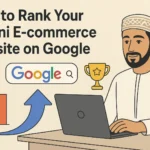How Omani Businesses Can Build Data-Driven Marketing Plans

Why Data-Driven Marketing Oman Matters
How Omani Businesses Can Build Data-Driven Marketing Plans is essential for companies in today’s competitive Omani market. Customers expect measurable results, personalized experiences, and strategies based on real data. Traditional marketing alone is no longer enough.
By leveraging analytics, customer insights Oman, and targeted campaigns, Omani businesses can make informed decisions, improve ROI, and strengthen customer relationships. Using data-driven marketing Oman ensures that campaigns are efficient, measurable, and aligned with business goals.
1: Set Clear Marketing Objectives
Every marketing plan must begin with well-defined goals. Without clear objectives, data collection and analysis have no direction.
Examples of strong objectives:
- Increase online sales by 20% in the next six months.
- Build brand awareness among Omani youth.
- Improve customer retention by 15% through targeted offers.
- Generate 500 qualified leads per quarter.
Clear objectives help Omani businesses decide what data to track and how to measure success.
2: Collect Reliable Data
The strength of any data-driven marketing plan Oman depends on the quality of data. Businesses should collect accurate data from multiple sources.
Main data sources:
- Website analytics: visitor numbers, bounce rates, conversion rates.
- Social media metrics: engagement, shares, follower growth.
- CRM and sales data: purchase history, customer lifetime value, repeat orders.
- Customer feedback: surveys, reviews, and ratings.
Using tools like Google Analytics, Meta Ads Manager, and CRM systems ensures that data is consistent and reliable.
3: Analyze Customer Insights Oman
After data collection, the next step is analysis. Omani businesses should use analytics to convert raw data into actionable insights.
Examples of insights:
- Retailers can identify which products are popular in Muscat versus Salalah.
- Travel agencies can find out which destinations appeal to younger travelers compared to families.
- Service providers can evaluate which campaigns deliver the highest quality leads.
By analyzing customer insights Oman, businesses can plan more effective campaigns and align their offerings with customer needs.
4: Segment the Audience
Not every customer responds the same way. Audience segmentation improves campaign relevance and results.
Common segmentation methods:
- Demographics: age, gender, income.
- Location: Muscat, Salalah, Sohar, or other regions.
- Behavior: purchase frequency, product preferences, response to promotions.
For example, a fashion retailer can promote trendy collections to young adults and traditional wear to older customers. Segmentation ensures that marketing campaigns Oman deliver the right message to the right audience.
5: Create Targeted Campaigns
With segmented data, Omani businesses can design campaigns that are highly personalized. Targeted campaigns perform better than generic ones because they directly address customer needs.
Examples:
- Email campaigns with product recommendations based on past purchases.
- Social media ads designed for specific demographics or interests.
- Promotions tied to Omani holidays and festivals like Ramadan or Eid.
When campaigns are targeted, engagement increases and marketing spend becomes more efficient.
6: Use Digital Marketing Tools Oman
Tools are essential for executing data-driven strategies. Omani businesses should use platforms that make campaigns easier to manage and measure.
Important tools:
- Google Ads and Meta Ads for targeted advertising.
- Email marketing platforms for personalized communication.
- CRM systems for tracking customer relationships.
- Social media management tools for monitoring performance.
Using these tools ensures that digital marketing Oman campaigns are precise, measurable, and effective.
7: Track and Monitor Key Metrics
Performance tracking is necessary to evaluate success. Omani businesses must focus on measurable key performance indicators (KPIs).
Essential metrics:
- Conversion rate: how many visitors take action.
- Customer acquisition cost (CAC): cost of gaining a new customer.
- Return on investment (ROI): profitability of campaigns.
- Engagement rate: likes, shares, comments on social media.
By monitoring these metrics, businesses can identify strong campaigns and address weak ones.
8: Optimize Continuously
Optimization ensures long-term success. Marketing plans should be flexible and updated based on performance data.
Examples:
- If ads are not performing, adjust targeting or creative.
- If website conversions are low, improve landing pages.
- If email open rates drop, test new subject lines or timing.
Regular optimization makes sure that marketing campaigns Oman stay cost-effective and competitive.
9: Personalize Customer Experiences
Personalization strengthens customer relationships. When businesses use data to personalize interactions, customers feel valued.
Ways to personalize:
- Recommending products based on browsing history.
- Sending personalized discounts during Ramadan.
- Tailoring website content to match customer interests.
Personalization leads to higher loyalty, repeat purchases, and stronger word-of-mouth marketing.
10: Build a Data-Driven Culture
A successful data-driven marketing Oman plan requires a company-wide mindset. Teams must learn to use analytics in daily decision-making.
Key actions:
- Train staff on using analytics tools.
- Encourage departments to base strategies on data, not assumptions.
- Set up dashboards for real-time performance tracking.
A strong data-driven culture ensures consistent decision-making and long-term competitiveness.

Conclusion
For businesses in Oman, adopting a data-driven marketing plan is no longer optional. By following these 10 steps, companies can:
- Use customer insights Oman to design better campaigns.
- Improve ROI through targeted and optimized strategies.
- Build long-term relationships with customers.
In today’s digital economy, Omani businesses that adopt data-driven practices will stay ahead of competitors and achieve sustainable growth.
Search
Recent Posts
Working Together Ideas come to life
No matter how big your company is, as you expand and reach new highs you’ll want an agency to have your back. One with a process
360presence@gmail.com

© 2023 360PRESENCE All rights Reserved
















